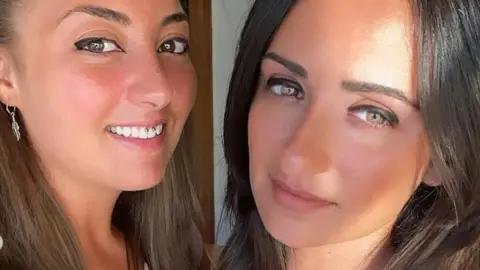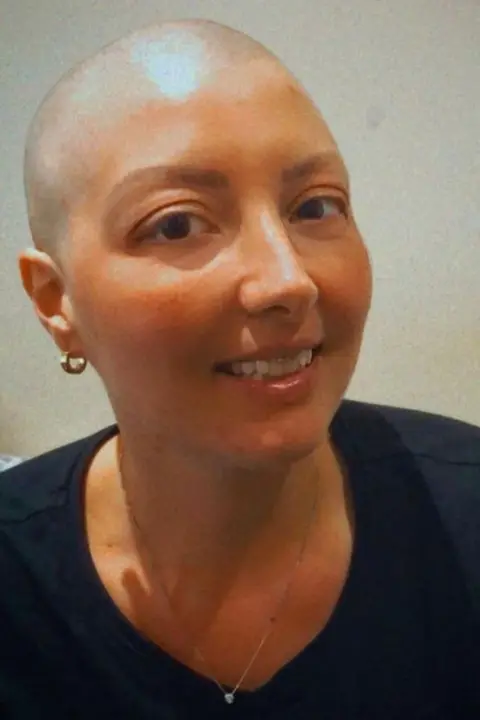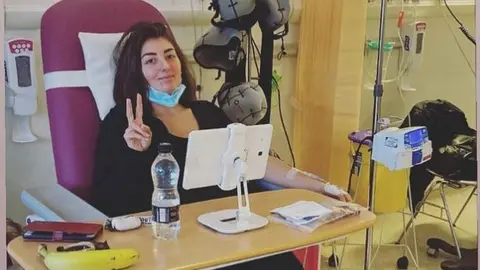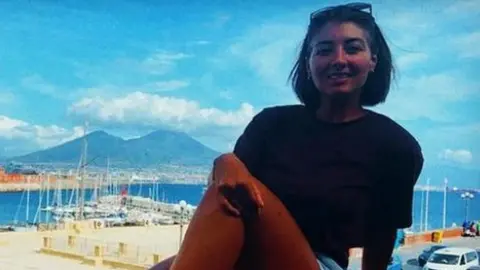'My breast lump turned out to be incurable cancer'
 Ester Sanna Ferraiol
Ester Sanna FerraiolEarlier this month BBC journalist BBC Sarah Lee shared her story about the failure of the NHS to diagnose her skin cancer until it had spread.
By the time the 29-year-old received a diagnosis of stage three malignant melanoma, she needed surgery to remove 24 lymph nodes.
Since her story was published, other people with cancer have been in touch with the BBC about their experiences.
One of them, 32-year-old Dorita Delle Donne from Ealing in west London, now has incurable breast cancer after being told in 2020 that a lump on her breast was a benign cyst and "nothing to worry about".
Dorita explains how she is trying to come to terms with her diagnosis.
 Dorita Delle Donne
Dorita Delle Donne"I am afraid of death as there are still so many things to do and an entire life to live.
"I found it so difficult to believe the cysts were not cysts. It was surreal news. Unbelievable."
Dorita's diagnosis of stage four metastatic triple-negative breast cancer came a year after she had contacted her GP, when she asked for a mammogram because she'd spotted a lump on her left breast.
Her request was denied as she was deemed "too young" for breast cancer. An ultrasound was carried out and she was told the "cyst" was not concerning.
But further investigations showed Dorita had the rare triple-negative form of breast cancer, which has spread to her liver, lymph nodes and pancreas.
 Dorita Delle Donne
Dorita Delle DonneOn the day of Dorita's first chemotherapy treatment in November, her father died of intestinal cancer in Italy.
"I could not even attend my own father's funeral," she said.
"You can imagine how much pain I was feeling those days and how heartbroken I was and am still."
The restaurant manager has also had to cope with fears about her own life expectancy; how to handle having a cancer declared incurable; and how to endure the side-effects of her cancer treatment.
Her partner of six years, Ester Sanna Ferraiolo, said: "Misdiagnosis has ruined Dorita's life at the age of 32; her ambitions, her dreams - but also my life has changed and the life of all people who love us.
"When she was diagnosed, she was so stressed that she began fainting in the house. I had to pick her up from the shower once."
 Dorita
DoritaAfter seven cycles of chemotherapy, Dorita stopped responding and she was moved to palliative care.
Ester has since set up a fundraising page to raise money for CAR T-cell therapy - a line of treatment that could potentially save Dorita, but which is not available on the NHS.
More than £28,000 has so far been raised to support the couple.

Triple-negative breast cancer
- An aggressive type of cancer that disproportionately affects younger women and black women
- About 15% of breast cancers are triple-negative cases
- These tumours lack receptors some other breast cancers have, meaning certain treatments will not work
- Symptoms can include a new lump or thickening of the breast or armpit; a change in size, shape or feel of the breast; skin changes in the breast such as puckering, dimpling, or a rash or redness of the skin; fluid leaking from the nipple in a woman who isn't pregnant or breastfeeding; changes in the position of nipple

"We remain focused on finding anything in the world that might turn out to be the cure," Ester said.
"In addition to using the money for treatment, I also want to make Dorita happy. I've asked her to start putting together a bucket list, and there are many places she wants to see and restaurants she wants to visit.
"We have many dreams together. One of them, which she also put on her bucket list, is for us to get married. I would like to see her happy after all of this pain."
Follow BBC London on Facebook, Twitter and Instagram. Send your story ideas to [email protected]
